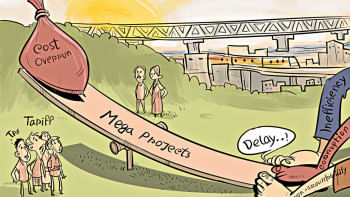Economic crisis in Bangladesh: It all comes down to accountability

Ministers and MPs of the ruling party often claim that Bangladesh has surpassed Singapore and Malaysia in terms of economic development. But in reality, depreciation of the taka against the US dollar, high inflation, energy crisis, and frequent load-shedding have all disrupted the country's economy and people's lives. In a sense, this crisis has been caused by the dwindling foreign exchange reserves, because Bangladesh's forex expenditure is higher than its forex income at present. As a higher demand for the dollar outweighs forex inflow, the value of taka against the dollar keeps falling, causing a crisis in the import of necessary fuel or raw materials too. But the events, decisions and processes behind this economic phenomenon are entirely political.
Although the government continues to blame the Russia-Ukraine war for the crisis, the issues of growing budget and trade deficit, money laundering, expensive development projects, using the forex reserves for infrastructure projects, and increasing import dependency in the energy sector were all already there long before the war broke out. If there was minimum accountability and an effective democratic process in the country's governance system, these issues would not exist year after year.
Due to a lack of accountability, the more development projects are taken up, the more corruption takes place and the more the development cost rises. Moreover, thousands of crores of taka have been embezzled in the name of loans from public and private banks under political institutional patronage. Money earned through corruption has regularly been laundered abroad. According to Global Financial Integrity (GFI), a Washington-based research institute, Bangladesh lost approximately $8.27 billion annually on an average between 2009 and 2018 because of traders misinvoicing the values of import-export goods to avoid taxes and/or to move money out of the country. If the government were accountable to the people, these incidents of corruption and money laundering would have been minimised.
The government also fails to tax the rich adequately, and instead helps them grow through different incentives. Thus, tax collection in Bangladesh as a percentage of GDP has been stuck at around 7.6 percent (as of May 2022) – the lowest in South Asia and one of the lowest in the world. As a result, the government's budget deficit has increased, but that does not stop it from taking up costly development projects one after another. To fund these projects, it takes loans from various domestic and foreign sources, which in turn puts more pressure on the economy. Bangladesh's foreign debt more than tripled in just 10 years, rising to $91.43 billion in 2021 from $27.05 billion in 2011, according to a World Bank report.
One of the reasons behind the forex reserve crisis is that foreign loans have been used to fund costly and wasteful projects that do not generate enough forex earnings to cover the reserve deficit. A common trend in megaprojects here is the abnormal time and cost overruns. Due to planning errors, irregularities and corruption, the costs escalate time and again. This trend has made Bangladesh home to some of the world's most expensive roads and highways, BRTs, metro rails, power plants, etc.
In the name of solving the power crisis, one after another rental and quick rental power plants and IPPs have been built, which enjoy hefty capacity charges even when they remain idle. Public and private sectors have taken loans in foreign currency to set up coal and LNG-based power plants and LNG terminals without taking the initiative to explore and extract domestic gas reserves and to increase the capacity to generate renewable energy. And all these have been done under the cover of the Quick Enhancement of Electricity and Energy Supply (Special Provisions) Act, 2010, which allows the authority to sign agreements with interested companies directly, without floating tenders. This has led to a situation where many power plants remain idle due to fuel shortage (oil, coal and LNG) now, while people and industries suffer from load-shedding, yet the power plant owners enjoy huge amounts of capacity charges.
Describing the importance of democracy, Nobel Laureate Amartya Sen in his book Development as Freedom highlighted its protective role, mentioning that when economic conditions are normal, the importance of this protective role of democracy is often not felt. But when the situation deteriorates, it becomes clear how important democracy is to prevent economic and social disasters.
Because an authoritarian regime is not accountable to the people, it provides various perks and privileges to different business groups to serve its own interests. This way, some business groups may be benefited in the short term, but in the long run, common people as well as the business community in general have to suffer. In Bangladesh, all the people, including the businessmen, are suffering from the extreme power and energy crises created by policies that were designed to benefit a few local and foreign businesses, without considering the long-term consequences on the economy. Due to frequent load-shedding, industrial production has been reduced significantly. Production costs are rising for factories that are running on diesel generators during power outages. Most factories are unable to utilise their workers and machinery for a large part of the day. Factory machineries are being damaged and raw materials are being wasted due to frequent power outages. As the production of export-oriented industries are being hampered, industry owners fear the loss of foreign buyers, which would further jeopardise our export earnings.
The biggest problem of an authoritarian regime is that the decision-making power becomes centralised, with no check and balance in place, which creates great risks for a country. Moreover, arbitrariness and vested groups' interests trump public interests in major decisions. The grassroots reality does not reach the centre of power, or even if it does, there is a tendency to hide it with fabricated statistics, which after a certain point leads to an even greater danger.
Describing the importance of democracy, Nobel Laureate Amartya Sen in his book Development as Freedom highlighted its protective role, mentioning that when economic conditions are normal, the importance of this protective role of democracy is often not felt. But when the situation deteriorates, it becomes clear how important democracy is to prevent economic and social disasters.
As an example, he mentioned the 1997 Asian financial crisis, which was a result of lack of transparency, accountability and people's participation in policymaking. If democratic systems were effective in those countries, maybe investment decisions and the associated risks would have been scrutinised more deeply, which might have averted the crisis.
In Bangladesh, in the context of the ongoing economic crisis, those who have been putting emphasis on the growth-centric development model at the expense of democracy may have started to realise now the importance of democratic accountability in the governance system.
Kallol Mustafa is an engineer and writer who focuses on power, energy, environment and development economics.

 For all latest news, follow The Daily Star's Google News channel.
For all latest news, follow The Daily Star's Google News channel. 










Comments